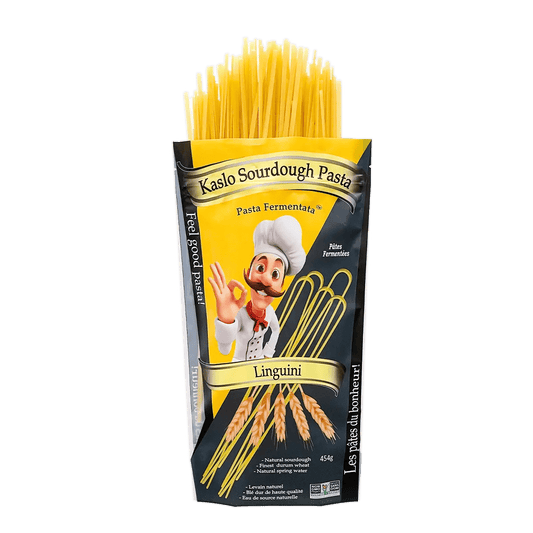If you're looking for the ultimate guide to all things sourdough you've come to the right place. This is the jump off point for a broad assortment of informative topics from health, to allergies, to gluten, chemistry, history and so much more.
What is the Benefit of Sourdough Pasta?
Is There a Low Glycemic Pasta? Discover the Surprising Truth!
The Glycemic Index Breakdown
- Wheat Pasta: 50-60 (high)
- Chickpea Pasta: 35 (low)
- Rice Pasta: 40-50 (moderate)
- Sourdough Pasta: 25-35 (low)
Does Sourdough Spike Blood Sugar? The Surprising Truth
Do Italians use Sourdough?
What is the healthiest bread for a type 2 diabetic?
If you're a diabetic or on the verge of it, finding the right bread options can be a constant challenge. With so many choices on the market, it's crucial to select breads that won't spike your blood sugar levels while still providing essential nutrients. Some of you have already found the secret but for others, here it is: enter sourdough bread - an unexpected hero for health-conscious diabetics.
Why is Sourdough Pasta Low Glycemic? Is that a good thing?
Is It Cheaper to Buy or Make Sourdough?
One of the biggest considerations when comparing homemade vs. store-bought sourdough is the time investment. Making sourdough from scratch is a labor-intensive process that can take 12 to 24 hours or more, from mixing the dough to the final bake. This includes the time needed to feed and maintain your sourdough starter. I love making my own but it sure doesn't make for a good use of time. And that's for bread. Combine the painstaking time to make sourdough with the painstaking time to make fresh home made pasta and that really stacks up the hours.
Is Sourdough Better for Celiac? The Surprising Truth
Is Store-Bought Sourdough Really Good for You?
Sourdough pasta is a game-changer in the world of carbohydrates. Unlike traditional pasta made with refined flour, sourdough pasta is crafted using a fermentation process that unlocks a wealth of gut-friendly nutrients. Here are some of the key benefits:
Which Pasta is Better for Diabetics?
I've been stuck in the quandary for a long time. I love the taste of wheat pasta but it leaves me feeling like I ate a lead balloon. And the alternatives - chickpea, rice and the others just taste gross in comparison. So what to do? The problem is even harder for diabetics. Anyway, I've done some research and this is what I've found.
Does Sourdough Pasta Have Less Carbohydrates?
Sourdough pasta is a game-changer when it comes to carb-conscious eating. Unlike traditional pasta made from refined wheat flour, our sourdough variety is crafted with a unique blend of whole grains and natural ingredients. This means you can enjoy the comforting flavors of pasta without the heavy, bloated feeling that often comes with regular pasta.
The fermentation process used to make our sourdough pasta helps to break down the complex carbohydrates, making them easier for your body to digest. This results in a lower glycemic index, which means the carbs are absorbed more slowly, helping to regulate blood sugar levels and keep you feeling fuller for longer.
Can You Eat Sourdough Bread Every Day?
If you're a sourdough bread lover like me, you might be wondering if it's okay to indulge in this delicious, tangy treat every single day. After all, sourdough is often touted as a healthier alternative to regular white bread. But is there such a thing as too much of a good thing?
Let's dive in and explore whether it's really possible - and advisable - to eat sourdough bread daily.
What Pasta Doesn't Spike Blood Sugar?
Since I love pasta I've tried my fair share of noodles over the years. From classic spaghetti to trendy zucchini spirals. Recently, I discovered a game-changing pasta that has me rethinking my carb-loading ways - sourdough pasta.
It may sound like a culinary oxymoron, but trust me, this stuff is the real deal. Unlike traditional wheat pasta that can send your blood sugar on a wild rollercoaster ride, sourdough pasta is the pasta of the people - the people who want to enjoy their noodles without the dreaded post-meal crash, that is.
Sourdough: Healthier and It Tastes Better
Eating sourdough bread can help improve your gut health and overall well-being. Sourdough is made through a natural fermentation process that breaks down gluten and other hard-to-digest components, making it easier on your stomach. It can help with better digestion, nutrient absorption, and even reduce inflammation. Plus, it has a lower glycemic index, which helps keep your blood sugar levels stable. Adding more sourdough to your diet can make you feel better and support your digestive system.
10 Things You Can Do to Improve Your Gut Health
Taking care of your gut health is important because it affects everything from your digestion to your mood. Here are ten things you can do to improve your gut health: eat a variety of foods, consume fermented foods like yogurt and sauerkraut, eat fiber-rich foods, avoid processed foods, manage stress, stay hydrated, exercise regularly, limit antibiotic use, practice mindful eating, and include sourdough foods in your diet. These steps help keep your gut bacteria balanced and your digestive system working well.
Unhealthy: Seven Ways That Too Much Gluten Makes You Sick
Eating too much gluten, a protein in wheat and other grains, can make some people feel sick. It can cause stomach problems like bloating and pain, and some people might even have a condition called celiac disease where gluten damages their intestines. High-gluten foods can also cause inflammation, weight gain, and nutrient imbalances, and might increase the risk of chronic diseases. It's important to have a balanced diet and not eat too much gluten if it makes you feel bad.
7 Reasons Why Gluten Bothers You
Many people feel bad after eating gluten, which is a protein in wheat. There are several reasons for this. Modern wheat is different from ancient wheat, and we eat more gluten now because it's in many processed foods. Also, how gluten is processed can make it harder to digest. Our gut health and the bacteria in our intestines can also affect how we react to gluten. Some people are sensitive to gluten even if they don't have celiac disease. Foods with certain carbs called FODMAPs can make symptoms worse, and stress and pollution might also play a role. Trying sourdough bread or pasta might help because it's easier to digest.
Is Sourdough Gluten Free?
Gluten is a protein found in wheat, and many people are sensitive to it. Sourdough bread is made with a special fermentation process that breaks down some of the gluten, making it easier for some people to digest. However, sourdough is not completely gluten-free and still contains some gluten, so it's not safe for people with celiac disease. If you have a mild gluten sensitivity, sourdough might be a better choice than regular bread, but it's important to check with a doctor first.
Is Sourdough a Fad? Or is it a Key to a Longer and Healthier Life?
Sourdough bread used to be a niche thing, but now it's super popular because of its great taste and health benefits. Over the past 20 years, people have started baking sourdough at home, sharing their creations on social media. Sourdough is easier to digest than regular bread, has a lower glycemic index, and is more eco-friendly. Its unique fermentation process breaks down gluten and makes the bread healthier. Chefs and home cooks love experimenting with sourdough to create new flavors and shapes. So, sourdough isn't just a fad—it's here to stay!
5 Ways to Look Smart for Dinner Guests Featuring Wine and Pasta
Pairing wine with pasta can make your meal even better! Sourdough pasta has a tangy flavor that goes great with certain wines. Here are five pasta dishes and wines that taste awesome together: Spaghetti Carbonara with Chardonnay, Lemon Garlic Fettuccine with Sauvignon Blanc, Wild Mushroom Ravioli with Pinot Noir, Spicy Arrabbiata Penne with Sangiovese, and Creamy Pumpkin Gnocchi with Riesling. These combos balance flavors and make your meal taste even better. If you’re unsure, a good Pinot Noir usually works with most dishes.
How Sourdough Ferments
Sourdough fermentation happens when flour and water mix with wild yeast and bacteria, creating gas and acids that make the dough rise and taste tangy. For pasta, sourdough fermentation makes the dough more stretchy, tender, and flavorful. This process breaks down proteins, making the pasta feel softer when you eat it. Sourdough pasta has a rich taste, combining tangy and nutty flavors, making it unique and delicious. People keep experimenting with sourdough pasta, adding herbs, spices, and different shapes to make it even more exciting.
Sourdough vs Regular Dough - What's the Difference?
Sourdough is a special kind of bread made using wild yeast and bacteria, giving it a unique tangy flavor and chewy texture. Unlike regular bread, which uses commercial yeast for quick rising, sourdough ferments slowly, making it healthier and easier to digest for some people. It also lasts longer because of its natural preservatives. The slow fermentation process creates complex flavors and breaks down gluten and phytic acid, making sourdough bread different and often better than regular bread.
5 Things You Didn't Know About Sourdough’s Origins
Sourdough bread has been around for thousands of years, starting in ancient Egypt and Mesopotamia, where people first discovered that mixing flour and water and letting it ferment made dough rise. During the Gold Rush, miners relied on sourdough, and it became a staple for settlers moving west. Sourdough has cultural importance in places like Alaska and San Francisco, where it's celebrated for its unique flavor. Recently, sourdough has become popular again as people enjoy making traditional bread at home.
Fighting Gluten – Sourdough to the Rescue
Sourdough bread is awesome for people who have trouble with gluten. Gluten is a protein in wheat, barley, and rye that makes dough stretchy but can be hard to digest for some. Sourdough is made using a starter that captures wild yeast and bacteria, which break down gluten during fermentation, making it easier to digest. Although sourdough isn't completely gluten-free, it has less gluten than regular bread and also helps your body absorb more nutrients and keeps blood sugar levels steady. Plus, it tastes great and stays fresh longer without preservatives.
7 Reasons Why Gluten Bothers You
Many people feel bad after eating gluten, which is a protein in wheat. There are several reasons for this. Modern wheat is different from ancient wheat, and we eat more gluten now because it's in many processed foods. Also, how gluten is processed can make it harder to digest. Our gut health and the bacteria in our intestines can also affect how we react to gluten. Some people are sensitive to gluten even if they don't have celiac disease. Foods with certain carbs called FODMAPs can make symptoms worse, and stress and pollution might also play a role. Trying sourdough bread or pasta might help because it's easier to digest.
Sourdough: Healthier and It Tastes Better
Eating sourdough bread can help improve your gut health and overall well-being. Sourdough is made through a natural fermentation process that breaks down gluten and other hard-to-digest components, making it easier on your stomach. It can help with better digestion, nutrient absorption, and even reduce inflammation. Plus, it has a lower glycemic index, which helps keep your blood sugar levels stable. Adding more sourdough to your diet can make you feel better and support your digestive system.
Get Me More of that Sourdough
If you’re familiar with the Cowbell SNL skit you know sometimes you can’t have too much of a good thing. Ready to reap the gut-loving benefits of sourdough? Here are a few simple ways to incorporate more sourdough into your daily routine:
- Enjoy a slice of sourdough toast with your morning eggs or avocado.
- Use sourdough bread for sandwiches, paninis, or grilled cheese.
- Get creative with sourdough pizza crusts, bagels, or English muffins.
- Buy some amazing sourdough pasta. It’s got all the benefits and we’ll bet you’ll find it tastier than regular pasta by a long shot!
Unhealthy: Seven Ways That Gluten Makes You Sick
Eating too much gluten, a protein in wheat and other grains, can make some people feel sick. It can cause stomach problems like bloating and pain, and some people might even have a condition called celiac disease where gluten damages their intestines. High-gluten foods can also cause inflammation, weight gain, and nutrient imbalances, and might increase the risk of chronic diseases. It's important to have a balanced diet and not eat too much gluten if it makes you feel bad.
The Gut Health Revolution: Why the Fuss About Digestive Wellness?
In recent years, there has been a surge in interest in gut health, driven by several key factors:
- Gut-Brain Connection: Research shows the gut microbiome influences brain function, mood, and cognitive health, emphasizing the importance of gut health for mental wellness.
- Immune Function: With 70% of immune cells residing in the gut, a healthy gut microbiome is crucial for immune resilience and defending against pathogens.
- Digestive Disorders: The rise in conditions like IBS, IBD, and GERD has led many to seek solutions for digestive discomfort, often linked to diet, stress, and microbiota imbalances.
- Lifestyle Factors: Modern lifestyle choices such as stress, poor diet, and antibiotic use can disrupt gut microbiota. People are adopting strategies like dietary changes and probiotics to support gut health.
- Preventive Healthcare: There's a growing emphasis on preventive healthcare, with a focus on gut health to reduce chronic disease risk, boost immunity, and enhance overall well-being.
Will Eating Sourdough Make Me a Better Athlete?
Sourdough bread, with its natural fermentation process, offers several benefits that may enhance athletic performance:
- Improved Digestion: The fermentation process breaks down complex carbohydrates and gluten, reducing gastrointestinal discomfort during exercise and improving nutrient absorption.
- Enhanced Energy Metabolism: Sourdough’s lower glycemic index allows for a slow and steady release of carbohydrates, helping athletes maintain stable blood sugar levels and avoid energy crashes during prolonged activities.
- Balanced Gut Microbiome: Sourdough promotes beneficial gut bacteria growth, supporting better digestion, immune function, and overall health, indirectly boosting athletic performance.
- Nutrient Absorption: The fermentation process increases the bioavailability of essential nutrients like iron, zinc, and magnesium, crucial for energy production, muscle function, and recovery.
- Reduced Inflammation: Some research suggests that sourdough may produce anti-inflammatory compounds, helping reduce chronic inflammation and promoting faster recovery from intense exercise.
- Support for Immune Function: A healthy gut microbiome bolstered by sourdough consumption can support immune resilience, which is vital for athletes, especially after intense exercise.
Sourdough = Fermented What the Heck Does That Even Mean?
Yes, sourdough is considered a fermented food. The process involves combining flour and water with wild yeast and lactobacilli bacteria to create a sourdough starter. During fermentation, these microorganisms metabolize the flour's sugars, producing carbon dioxide that leavens the dough and organic acids that give sourdough its tangy flavor. This process not only helps the dough rise but also breaks down complex carbohydrates and proteins, making them more digestible and potentially enhancing nutrient bioavailability. Additionally, the beneficial bacteria and yeast contribute to the bread's unique flavors and aromas, distinguishing it from bread made with commercial yeast.
Not Just Alcohol: Fermented Foods and Their Secret
Fermented foods are created through a natural process where microorganisms like bacteria and yeast break down sugars in food, producing beneficial compounds like lactic acid. This process enhances the flavors, textures, and health benefits of the foods. Fermented foods are packed with probiotics, promoting a healthy gut microbiome which supports digestion, boosts the immune system, and improves mood. They also increase nutrient absorption, aid digestion, and offer unique and delicious flavors. Examples include sauerkraut, yogurt, kombucha, kimchi, pickles, and sourdough bread. Additionally, fermentation acts as a natural preservative, extending the shelf life of these foods.
Does Fermented Food Help You Live Longer? Stories From Around the World
Many cultures around the world incorporate fermented foods into their diets, contributing to their overall health and longevity. East Asian countries like Korea, Japan, and China consume kimchi, miso, and natto, while Eastern European and Baltic countries enjoy sauerkraut, kefir, and sourdough bread. Scandinavian nations have a history of eating sourdough bread, fermented fish, and cultured dairy products. In Africa, traditional fermented foods include porridges and milk products. Middle Eastern and Mediterranean diets feature yogurt, labneh, and pickled vegetables. Indigenous communities worldwide also have unique fermented foods based on local ingredients. Fermented foods provide unique flavors, nutritional benefits, and culinary diversity, significantly enhancing the health and longevity of these populations.
TLDR; What Studies Say About Sourdough – 5 Health Outcomes From Eating It
Research indicates that fermented foods, including sourdough, offer numerous health benefits. These foods enhance gut health by promoting a diverse microbiota, aid in managing digestive disorders like IBS and IBD, improve metabolic health with better blood sugar control and lipid profiles, support immune function by modulating immune responses, and may even boost mental health by reducing symptoms of anxiety and depression. However, these studies are often observational, suggesting associations rather than direct causation.
Can Eating Improve My Immunity?
Research indicates that fermented foods, including sourdough, may offer mental health benefits by influencing the gut-brain axis, reducing symptoms of depression and anxiety, and improving mood and well-being. These effects are thought to be mediated by probiotics' impact on gut microbiota, neurotransmitter production, inflammatory pathways, stress response systems, and gut barrier function. However, further research, including longitudinal studies and randomized controlled trials, is needed to better understand these things.
Tummy Upset? 4 Reasons Sourdough Can Help
If your stomach often feels upset, sourdough bread might help! Digestive problems like IBS (Irritable Bowel Syndrome) and IBD (Inflammatory Bowel Disease) can cause pain, bloating, and other uncomfortable symptoms. Sourdough bread, made through a special fermentation process, is easier to digest because it breaks down gluten and tough compounds in wheat. It also supports healthy gut bacteria, reduces FODMAPs (carbs that can cause gas and bloating), and helps your body absorb important nutrients better. Adding sourdough to your diet could make your tummy feel better!
Feeling Good Without FODMAPs. A Simple Guide to Happy Tummies
FODMAPs are special types of sugars found in some foods that can be hard for some people's stomachs to digest, causing bloating, gas, and pain. People with sensitive tummies might need to watch out for foods high in FODMAPs like apples, onions, and milk. To keep your stomach happy, try eating smaller portions, choosing lower FODMAP foods like strawberries and carrots, listening to your body, staying positive, and maybe even trying sourdough pasta!
Real or Fake. How to Tell if it’s Really Sourdough
If you love sourdough bread, you might have noticed that some bread labeled as sourdough isn't real sourdough. To check if it's the real deal, look at the ingredients list for just flour, water, salt, and natural yeast. Real sourdough takes a long time to make, so it should taste tangy and chewy. It’s usually made by small bakeries that use a special starter mix of flour and water. Buying from trusted artisan bakeries can help you find genuine sourdough.
Kaslo Sourdough Pasta: A Delicious Journey Through History
It's not only the best sourdough pasta in the world, it's also the best sourdough pasta in the world. If you love sourdough or struggle with the gluten content in regular pasta, you owe it to yourself to give this a try. We're happy to sell Kaslo Sourdough pasta - made with love by the Lettrari family in Kaslo, BC.
Sourdough Discard Pasta Recipe
If you already make sourdough bread then we don't need to tell you how much work it is and how good it is for you compared with yeast based bread.
Option A. You can definitely use sourdough dough to make pasta yourself. There's a few options online that share details but the one we like the most is here at The Pantry Mama.
Option B. Buy from
How to Make Sourdough Pasta
Are you looking to elevate your pasta game? Want to see if you can make your own sourdough pasta and how much better it is than the amazing choices we offer for purchase? Why not try making sourdough pasta from scratch? We dare you! It's not that hard although we warn you it can be time consuming, even for experts who know what they're doing. Follow these easy steps to make delicious sourdough pasta at home. If you can't be bothered just order some from our store. It's delicious!





